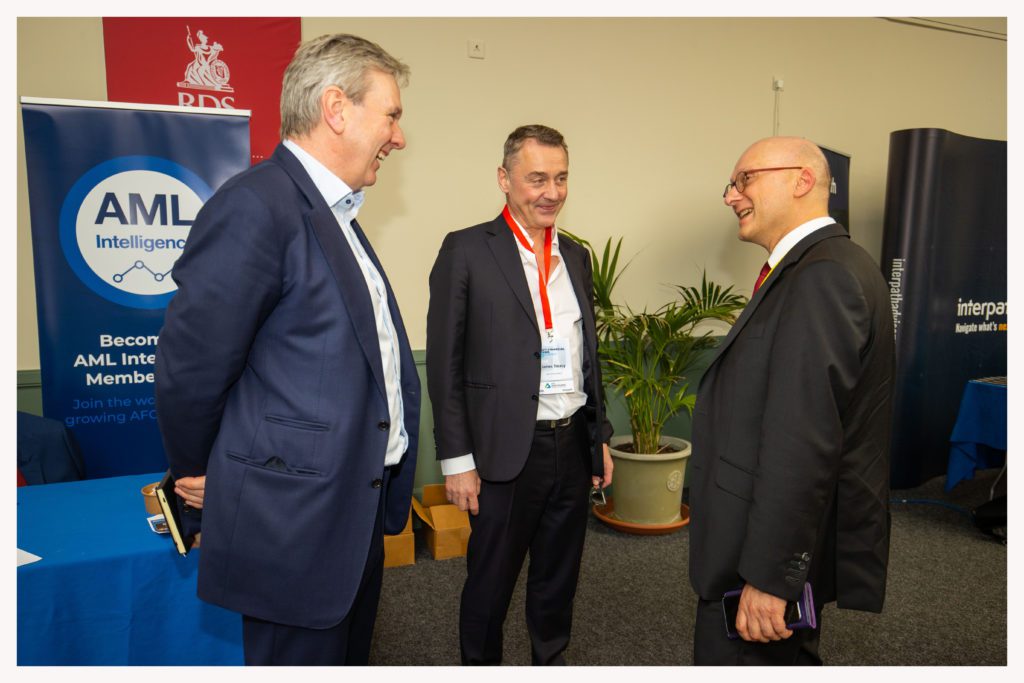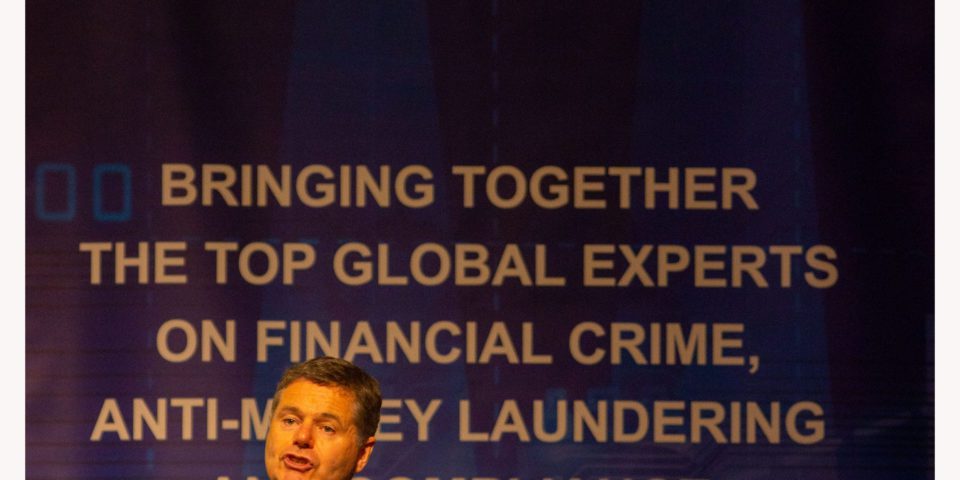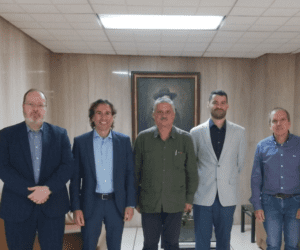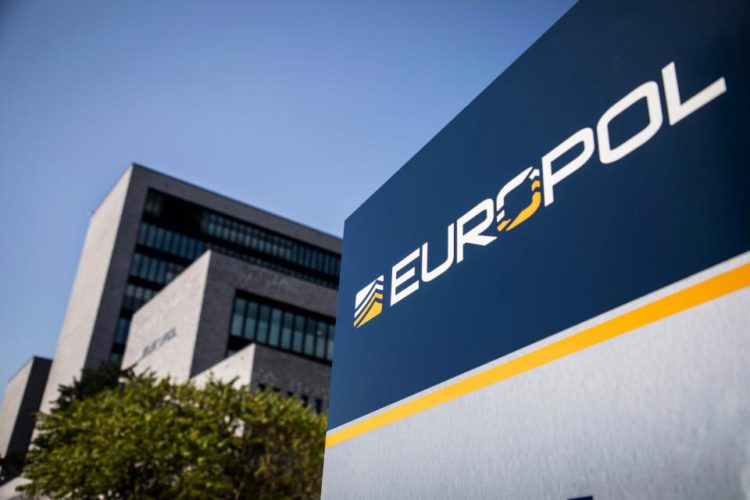Thank you all for the opportunity to address you today, and thank you for inviting me and for organising this excellent event bringing together so many global experts on tackling financial crime.
I would like to give a particular welcome to Dr. Marcus Pleyer, Deputy Director General of the German Federal Ministry of Finance and former President of the Financial Action Task Force. I am glad you get to experience Dublin with the wonderful sunny weather we are having!
It is important to have opportunities such as this, to engage with other experts, industry participants, supervisors, law enforcement, and regulators, so that experience and learnings can be shared and best practices developed.
My six years as Ireland’s Finance Minister have given me good insight into, and respect for, the great work done by the Financial Action Task Force.
But I am addressing you today with a different ‘hat’ on, that of President of the Eurogroup. I was re-elected in January this year for a second term in this role, where I drive the agenda of the monthly meeting of euro area finance ministers to coordinate our economic and fiscal policies, and discuss matters of shared responsibility, including our common currency, the euro.
So I will share with you what issues are on the minds of European finance ministers right now.
Economic outlook
But first let me say a few words on the economic outlook. The euro area economy continues to show resilience in a challenging global context. Lower energy prices, abating supply constraints and a strong labour market supported moderate growth in the first quarter of 2023.
According to Eurostat’s preliminary flash estimate, GDP grew by 0.1% in the euro area in the first quarter of 2023. Leading indicators suggest continued growth in the second quarter. This better-than-expected start to the year resulted in the Commission’s Spring 2023 Economic Forecast revising upwards the GDP outlook for the euro area economy to 1.1% in 2023 and 1.6% in 2024.
Likewise, a record-strong labour market is bolstering the resilience of the euro area economy. Euro area unemployment remains low, forecast at 6.8% in 2023 and 6.7% in 2024.
Inflation has proved stickier than expected, and has been revised upwards compared to the winter forecast, but nonetheless is forecast to decline gradually over the remainder of 2023 and in 2024. Euro area inflation is now forecast to be 5.8% in 2023 and 2.8% in 2024, respectively 0.2% and 0.3% higher than in winter.

Turning to public finances, the euro area aggregate debt-to-GDP ratio is projected to decline steadily to below 90% in 2024, although this is still above the pre-pandemic levels, and there are large divergences of fiscal trajectories across Member States. Euro area aggregate deficits are expected to be above target in 2023 at -3.2%, and falling below target in 2024, at -2.4%, thanks in large part to the phasing out of energy support measures.
While I am naturally an optimist, I think the figures speak for themselves in terms of the resilience of the euro area economy. We are in a good place to respond to the challenges we face, despite the global uncertainty.
Having set out that context, I would like to speak about three policy areas that I am prioritising in the Eurogroup, and how they might influence your work. They are:
- progress on Banking Union
- the Digital Euro project; and
- how do we fund a greener, digital, more competitive future for Europe, and what the role of the private sector is in that
Banking Union
So turning first to Banking Union, which many of you in this room will be familiar with given the industries you work in.
Events over the last few months in both the US and Europe have reaffirmed to all of us, if we needed affirmation, the need for us to complete the Banking Union. Doing so is crucial for European stability and the competitiveness.
It is fair to say that advancing Banking Union has been one of my priorities since taking up the office of President of Eurogroup back in July 2020.
Last summer at Eurogroup, after much time, effort and political energy exerted, Ministers reached an agreement on the future of the Banking Union with a clear statement.
Specifically, we asked for steps to be taken to strengthen the common framework for bank crisis management and national deposit insurance schemes – or CMDI in short.
In April, the European Commission came forward with legislative proposals in this area, which encompassed all of the areas that Eurogroup emphasised in our statement last June.
Just a few weeks ago, at the Eurogroup informal meeting in Stockholm in April, we had a frank and good discussion on the banking sector, discussing recent developments and the broad outlines of the CMDI proposal itself.
As things stand, there are areas where Ministers are agreed but also, as one would expect, areas where we are not yet aligned.
However, I remain confident that we will converge in the months ahead.
I intend to keep the momentum behind this project. It will be difficult, but by no means impossible.
Digital Euro
The second priority project for me is the digital euro. The Eurogroup has been actively engaged in discussions on this topic before the ECB made its decision to launch the investigative phase of the digital euro project.
The reason being the declining use of cash and trends towards digitalisation in the payments and financial systems, which have only continued to accelerate.
We have had constructive engagement with both the ECB and the Commission on this issue.
We welcome the Commission’s intention to propose legislation on the digital euro [expected in June] and we will continue our political engagement going forward.
Finance ministers are well attuned to the fact that so many of the decisions on the digital euro are inherently political as they will influence the daily lives of our citizens.
Some of the choices we are grappling with will be so familiar to you all, as they relate to how we ensure that a digital euro is not only convenient and widely adopted, but also functions properly in terms of anti-money laundering requirements and prevents it being used to fund illegal activities.
All this underscores the importance of close and constructive engagement by industry leaders such as yourselves with the ECB and the Commission, and with national governments, as the design of the digital euro crystallises.
Funding the Future / Private Capital
Finally, the role of private capital in funding a greener, digital, more competitive future for Europe.
It would not be an exaggeration to say that investment needs have been flagged at nearly every Eurogroup meeting.
We are all acutely aware that Europe has extensive financing requirements, which have been amplified by both a lack of investment in the previous decade and also the need to fully embrace digitalisation and respond to climate change.
Investment needs will be very large over the next decade, but they cannot come from public sources alone: we need to leverage private sources in parallel.
This will be crucial to bolster euro area competitiveness.
At the Euro Summit in March, European leaders called on us all to step up efforts and to take forward Capital Markets Union.
In order to do so, we need to understand what are the barriers to private sector investment in our economies, and then how to go about removing them.
This is clearly a vast project but just to reemphasise that economic and monetary union is totally dependent on a vibrant and well integrated capital market.
From my perspective, I think this is a good time to take stock of where we are, in terms of funding, innovation and competitiveness.
Again, this is where politicians need to hear from you. The Eurogroup will be inviting market participants to share their experiences and insights with us, later in the year.
From this, we can get a better picture of where we stand on CMU and what we all need to do to fully unlock our capital markets.
This is no small task and it is never easy.
But if it was easy, it wouldn’t be worthwhile!
Conclusion
I will conclude here and I look forward to your questions which I will do my best to answer.








